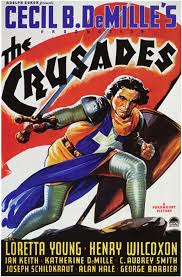Movie Review: The Crusades (1935)
It is the 12th Century, and the Holy Land has been seized by the Saracens, under the command of Saladin (Ian Keith). Crosses, Bibles and other Christian symbols are burned, and the Christian inhabitants of Jerusalem taken into captivity. A hermit (C. Aubrey Smith) confronts Saladin and declares that he will call a crusade.
Sure enough, we next see the hermit at the court of King Philip of France (C. Henry Gordon), who accepts the call to go on crusade against the infidels. But first he must secure his kingdom against invasion, so it’s off to England to marry his sister Alice (Katherine DeMille) to her betrothed, King Richard the Lionhearted (Henry Wilcoxson.)
Richard, as it turns out, is a boisterous fellow who enjoys hanging with his bros and participating in violent sports in preparation for serious fighting. He especially loves harassing his minstrel friend Blondel (Alan Hale), who fights back with joking rhymes. Richard is in no mood to get married, especially to the dour Alice. To be honest, Richard is kind of a jerk who cares little for God.
So when the hermit arrives to call the crusade, Richard is lured not only by the thought of combat, but by the fact that the pledge of the crusader overrides all others, including arranged betrothal. The hermit can tell that Richard’s motives are not pure, and warns him that he’ll be humbled, but accepts his pledge nonetheless. Richard is less enthused that Alice has taken the crusader’s oath as well and will also be going to the Holy Land.
Meanwhile, Prince John conspires with the Marquis of Monferrat. It would serve them both well if Richard did not return to England.
When Richard’s troops arrive in Marseilles, he discovers that he really should have brought more gold with him, as the King of Navarre (George Barbier) isn’t taking IOUs for his cattle and grain. A reluctant bargain is struck; Richard will marry Navarre’s daughter, Berengaria (Loretta Young) in exchange for the supplies. Richard sends his sword to the wedding ceremony as a stand-in, which ticks the bride off no end–she wasn’t keen on an arranged marriage in the first place, and the groom can’t be bothered to even show up for it?
The next morning, Richard finally sees Berengaria and realizes that she’s the hottest woman in Europe. He pretty much abducts his reluctant bride to the Holy Land with him.
Richard’s actions create discord among the assembled crusader kings, especially drawing the enmity of King Philip, who is understandably infuriated by the insult to his sister. Richard and Berengaria’s relationship is also pretty rocky; she’s coming to admire his moxie, but still considers him a jerk. And Saladin also is taken by Berengaria’s beauty, adding more intrigue to the mix.
This highly romanticized tale of the Third Crusade was directed by Cecil B. DeMille. This is most obvious during the exciting scenes of the siege of Acre, with war machines and hundreds of extras battling it out by and on the walls of the city. There’s also a wonderful set piece with the Crusaders arranged on stairs, trying to get a glimpse of the True Cross.
By this time, the Hays Code had come in, so the violence is relatively subdued, and the sexual overtones are considerably reduced. (Doesn’t stop Berengaria from having a dress that clings to her curves, mind you.)
After an ugly scene at the beginning where Christian women are sold into slavery, the Muslims aren’t shown as being particularly bad people, just militarily opposed to the crusaders. Saladin himself is a noble fellow, and a worthy opponent to Richard. (Indeed, he winds up negotiating peace with Richard, and returning the captured Berengaria, allowing Richard to keep his vows without further violence.)
The treatment of women in the movie, however…they are persistently treated as property and bargaining chips. Alice is more or less okay with this. She’s fiercely devoted to protecting France by marrying the King of England (whoever that might turn out to be) and maintains her dignity throughout. Berengaria is much less pleased, and it takes her most of the film to reconcile herself to Richard.
Richard, on the other hand, goes from a self-centered jerk who doesn’t care about the consequences of his actions on other people, to a humbled warrior who is willing to pray to God for aid, and abide by treaty.
As a movie, this is a fun, well-shot, well-acted film. However, it’s very much Hollywood history, and should not be taken as at all a serious examination of the Third Crusade so much as a romantic epic.
For another romanticized look at the Third Crusade, see my review of The Boy Knight by G.A. Henty.

